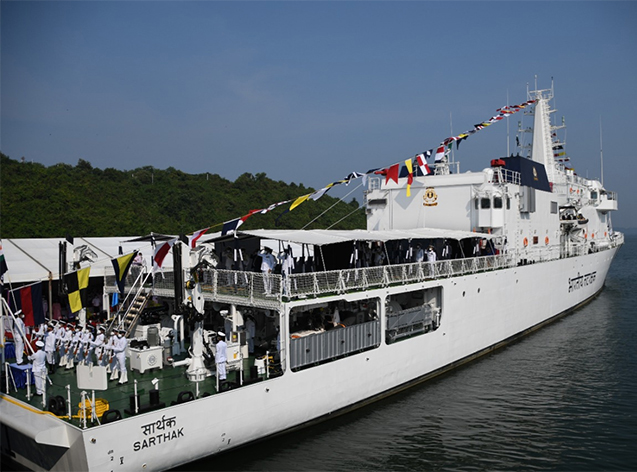OPV Sarthak | 29 Oct 2021
Why in News
Recently, an Offshore Patrol Vessel (OPV), Indian Coast Guard Ship (ICGS) Sarthak has been commissioned and dedicated to the nation at Goa by the Indian Coast Guard.
Key Points
- It is a 105-meter-long ship displacing 2,450 tons and is propelled by two 9,100 kilowatt diesel engines designed to attain a maximum speed of 26 knots.
- It is 4th in the series of five OPVs. And will significantly boost the maritime safety and security of the nation.
- OPVs are long-range surface ships, capable of operation in maritime zones of India, including island territories with helicopter operation capabilities.
- Their roles include coastal and offshore patrolling, policing maritime zones of India, control and surveillance, anti-smuggling and anti-piracy operations with limited wartime roles.
- Development:
- It has been designed & built indigenously by M/s Goa Shipyard Limited (GSL) in line with the government’s vision of ‘Make in India’.
- It has about 70% indigenous content, thus providing the necessary fillip to the Indian shipbuilding industry and a giant leap towards achieving ‘Atmanirbar Bharat’.
- It has been designed & built indigenously by M/s Goa Shipyard Limited (GSL) in line with the government’s vision of ‘Make in India’.
- Features:
- It has state-of-the-art Navigation and Communication equipment, sensors and machinery.
- It is capable of carrying a twin-engine helicopter, four high speed boats and one inflatable boat for swift boarding and Search & Rescue operations.
- It is also capable of carrying limited pollution response equipment to undertake oil spill pollution response at sea.
- Utility:
- It will be deployed extensively for Exclusive Economic Zone (EEZ) surveillance, Coastal Security and other duties as enshrined in the Coast Guard charter of duties, to safeguard the maritime interests of the Nation.
- Other OPVs:
Indian Coast Guard
- It is an Armed Force, Search and Rescue and Maritime Law Enforcement agency under the Ministry of Defence. It is headquartered in New Delhi.
- It was established in August 1978 by the Coast Guard Act, 1978 as an independent Armed force of India.
- The concept of forming ICG came into being after the 1971 war. The blueprint for a multidimensional Coast Guard was conceived by the visionary Rustamji Committee.
- It has jurisdiction over the territorial waters of India including contiguous zone and Exclusive Economic Zone (EEZ).
- It is responsible for marine environment protection in maritime zones of India and is coordinating authority for response to oil spills in Indian waters.

